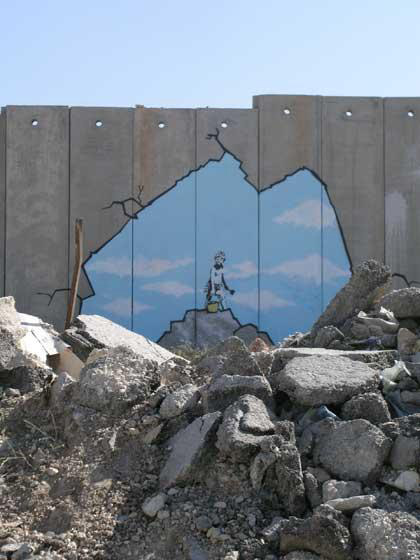
February 2006
Inside the Lines: Paola Rizzuto
“Oh, so what are you here to do, liberate us?” The man who spoke went thick on the sarcasm. As a Palestinian living in the West Bank, he’d become jaded after years of seeing promises of amelioration dissipate into the hazy blue sky. Rutgers University undergrad Paola Rizzulo was not sure what to expect. It was her first time inside the lines.
Paola smiled and warmly greeted the stranger in Arabic. As she reached out to him in his native language, a modicum of trust began to form, as he saw that this girl, this American student, actually did seem to care about what was happening to his land and his people. But truly, what immediate relief was she providing him besides companionship and an understanding heart, she wondered?
Paola visited the West Bank this past July. As a member of New Jersey Solidarity, she was anxious to see what life was really like on the ground in Palestine. Since she was spending the year at the American University of Beirut in Lebanon, she decided to spend a few days in Palestine. At the very least, she would get to visit her good friend who lived on a majestic hill, the highest point to be seen for miles. And she would see Ramallah. Having spent nearly a year in Lebanon already, Paola had already met many ethnic Palestinians, the great majority of whom lived in refugee camps. Paola notes that the general sentiment among Palestinian refugees in Lebanon is resentment toward the Lebanese government. People are angry because they are not allowed to hold positions in over 100 of the most lucrative Lebanese career fields. Buildings in the camps are not allowed to be fixed or repaired. Some refugees are not even allowed to enter and leave their camps freely. This latter point was not the case in Sabra and Shatilah, but this did not make the visit to the cold, stone tenements any cheerier. Paola showed me pictures she took inside Sabra and Shatilah. Shadows overpowered narrow alleyways in between crowded domiciles. Children played ball in the street, and laundry hung out to dry, but an umbra of despair seemed to live on. However, Paola could not overemphasize how kind and welcoming the people of Sabra and Shatilah were to her. They did their best to make her feel at home, and everyone “maintained a spirit of resistance,” which did make hearts a bit brighter.

Graffiti on the Apartheid Wall in Palestine
|
Once inside Palestine, “Israeli” soldiers began to interrogate everyone from the bus. Paola’s interrogation was long, repetitive, and a bit surreal, but at least the “Israeli” facility was air conditioned, providing some relief to the stasis. Questions included “what religion are you?” “what religion is your father?” and “do you know anyone in Damascus?” Questions were often repeated and rephrased. Paola noted that, during the entire interrogation, the “Israelis” had her passport and documentation. They try and keep “an iron grip on your documentation” while they have you in interrogation. You are powerless, and it feels like “you’re on pins and needles for as long as they had your papers.” She was relieved to find out, at last, when her passport was returned to her, that it had not been stamped. Had the “Israelis” stamped it, her passage back into Lebanon, and even Syria, would have been severely delayed at best, since neither of the two countries have diplomatic relations with the Zionist entity.
The friend Paola came to visit lives in a beautiful house at the highest point of his village’s hill. However, to get there, it’s “very obvious you’re driving through and ‘Israeli’ settlement.” Houses not part of the settlement often had “for sale” signs on them written in English – obviously not being sold by their Palestinian owners. For all of the land leading up to the hill is slated to be annexed to the settlement. Families living a little way downhill from her friend had been given six months to evacuate by the “Israelis.” No one is sure whether the houses will be knocked down or if settlers will simply move in and take over.
Back in New Jersey, flipping through pages of photographs, a myriad of emotions cross Paola’s face. Recognition of the physical beauty of Palestine is juxtaposed with the political reality of the abominations actually occurring there. If there was one point she drove home to me, both in her words and expressions, it is that Palestine is majestic – but not yet free.
Contact us: Al-Awda Newspaper
(973) 954-2521
info@newjerseysolidarity.org
http://www.newjerseysolidarity.org
New Jersey Solidarity
344 Grove Street, Suite 131
Jersey City, NJ 07302
Our editorial collective is responsible for editing, laying out and developing this publication. We are open to new members who are in accord with the mission and principles of this newspaper.
Please contact us about your upcoming events and activities of interest to readers of this publication.
Please contact us for advertising rates and information, or for material on becoming a distributor.